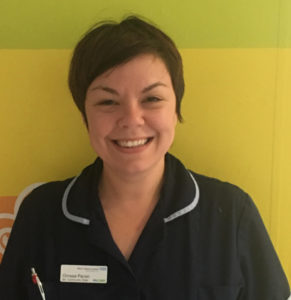Paediatric Community Nursing Team
Our paediatric department is still operating as normal.
If your child is feeling unwell without COVID-19 symptoms, you should still contact you GP practice in order to get a referral into the hospital. Our Paediatric outpatient clinics are still continuing as normal. Our Consultants are assessing whether your child should attend a face-to-face clinic, have a telephone consultation or if your appointment will be rebooked for a later date.
If you are asked to attend a face-to-face appointment, it is important that you do come to the hospital as the consultant will have good reason for wanting to see you. You do not have to walk through the hospital building in order to reach your appointment, there are direct access routes into Milton Mouse and Luing Cowley.
We are taking all necessary precautions to ensure you are safe and are staggering appointments so there are not many people in the waiting room, if you feel uncomfortable waiting inside the building, please ring us when you have arrived on site, stay in your car and we will call you once it is time for your appointment. You may see the nurses wearing personal protective equipment, this is to protect you and other visitors. Appointments should be attended by the patient and ONE parent/carer, no siblings or other family members should be attendance. Should you have any concerns or wish to speak with anyone please contact 01908 997 003.
Whenever possible our paediatric community nursing team provide care to children living in the Milton Keynes area.
The paediatric community nursing team provide care at home and in the wider community for young people, children, babies and neonates with long-term illnesses.
They look after children with diabetes, respiratory illness, cancer and blood disorders, providing a range of care and treatments including wound care and IV antibiotics.
The team includes neonatal nurses who provide specialist care within the community and an oncology lead nurse who links with principle treatment centres. They also provide advice and support to any family admitted to the paediatric assessment unit or Ward 5 after they have gone home.
Senior Sister

Chrissie Parren is the senior sister for the Paediatric Community Team. Chrissie is happy to be contacted via email [email protected]
Staff
Ear, Nose and Throat
Maternity
Neonatal Unit
- Safeguarding Children and Young People (0-18 years)
- Prolonged Jaundice in Babies
- Red Box Patient System
Paediatric Diabetes
Paediatrics
- Chest infection/pneumonia
- Paediatric Patient Initiated Follow Up appointment
- Paediatric Bereavement Booklet
- Home Leave Agreement
- Traction: principles and application
- Laparoscopy: Going Home After
- How to Administer Buccolam®
- Appendicitis and Your Child
- Urine Sample
- Your Child’s Outpatient Appointment
- Urinary Tract Infections (Complications and Tests)
- Fasting – All You Need to Know (A Guide for Parents/Carers)
- Skin Prick Testing
- Food Challenges
- Whooping Cough (Pertussis)
- Viral Induced Wheeze
- Urinary Tract Infections
- Treatment of Hypoglycaemia (Hypo’s) For Insulin Pump Users
- Treatment of High Blood Glucose Levels (Hyperglycaemia) on Pump Therapy
- Preventing Diarrhoea and Vomiting in Children 0-5 years
- Rectal Paraldehyde For Stopping Seizures
- My Child is Having Sedation: Advice for Parents
- Home Intravenous (IV) Antibiotic Teaching Pack for Children / Parents / Carers of Children with Cystic Fibrosis (CF)
- High Blood Glucose Levels (Hyperglycaemia) On Pump Therapy
- Head Injury – Discharge Information for Parents / Carers (Paediatrics)
- Head Injury Advice Sheet for Children
- Fever Advice Sheet for Children 0-5 years
- Egg allergy and Mumps, Measles and Rubella (MMR) Vaccination in Children
- Cystic Fibrosis Information for Families
- Children and young people with constipation – Advice sheet for parents and carers
- Children’s Community Nursing Service
- Bronchiolitis Advice Sheet
- Basal Rate Testing for Insulin Pump Users
- Haemolytic Disease of the Newborn (HDN)
- Pregnancy testing before an operation, investigation or treatment
- A Leaflet for Young People: Safeguarding (16-18 Years)
- Young People’s Guide
- Recurrent Abdominal Pain
- Pain Assessment (A Guide for Parents / Carers)
- Central Venous Catheters: A Guide for Parents and Carers
- Patient Controlled Analgesia (PCA) – A guide for Older Children (8-16yrs)
- Childhood obesity
- Paediatric Pre Assessment Booklet
- Safeguarding Children and Young People (0-18 years)
- Nephrotic Syndrome
- Care of Your Mouth after Oral Surgery
- Incision and Curettage
- Protecting your baby from low blood glucose
- Central Line Training for Schools
- Care of a child with a chest infection / pneumonia
- Prolonged Jaundice in Babies
- Child Protection Medical
- Children’s Cancer Services
- Pica (Eating Inedible Objects) and Polydipsia (Drinking Excessively)
- Clobazam for preventing seizures
- Dairy Re-introduction plan – Milk Ladder
- Egg introduction – Egg ladder
- Ethosuximide for preventing seizures
- House dust mite allergy
- Lamotrigine for preventing seizures
- Levetiracetam for preventing seizures
- Midazolam for stopping seizures
- Oral carbamazepine for preventing seizures
- Red Box Patient System
- Paediatric Epilepsy Service
- Sodium valproate for preventing seizures
- SUDEP (Sudden death in epilepsy): What you need to know
- Topiramate for preventing seizures
Respiratory/Chest Medicine
Last Modified: 4:10pm 06/04/2020
